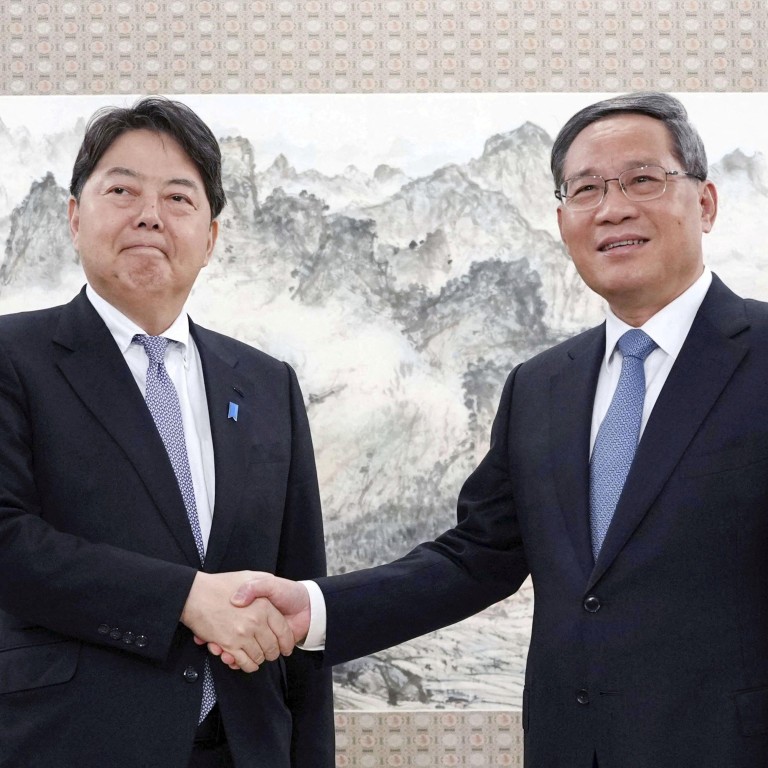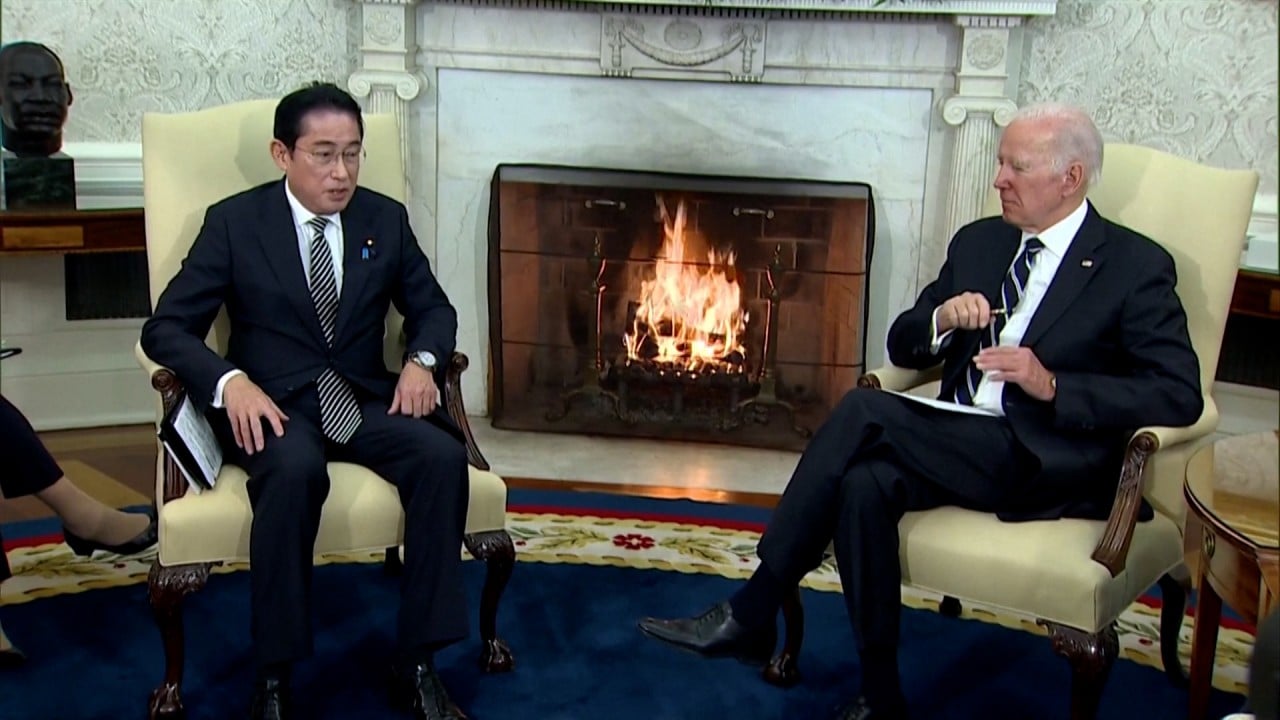
China-Japan ties: Beijing rolls out high-level talks for Tokyo foreign minister but little progress, say analysts
- Yoshimasa Hayashi met Chinese Premier Li Qiang, top diplomat Wang Yi and Foreign Minister Qin Gang
- But no breakthroughs on major contentious issues – including tech restrictions, detention of a Japanese citizen and regional conflicts – observers say
In talks with Chinese Premier Li Qiang in Beijing on Sunday, Hayashi pledged not to decouple from China, saying Japan would not adopt a “de-Sinicisation” approach, according to the Chinese foreign ministry.
“[We] hope the two countries will work together to maintain free trade, practise real multilateralism, actively promote the process of regional integration, maintain the stability and smoothness of the industrial chain and supply chain and jointly reduce uncertainty and increase stability, to make due contributions to the development of the region and the world,” Li said.
Li said China and Japan’s trade interests were “deeply integrated”. The two countries should continue to expand their economic cooperation, especially in the digital economy, green development, finance and healthcare.
China’s top diplomat raises concern over risk of ‘backsliding’ by Japan
China is the biggest customer of Japan’s Tokyo Electron, a world-leading chip machinery maker. It accounted for a third of the Japanese company’s overseas sales last year, according to Nikkei Asia, citing data from the country’s Semiconductor Equipment Association.
Industry observers expect Japan’s move will hit its semiconductor industry badly and destabilise the global supply chain.
Also on Sunday, Hayashi had dinner with China’s top diplomat Wang Yi, who urged Japan not to be “short-sighted” by following the US’ “wrongful” China policy.
“China-Japan relations remain generally stable at present, but there are various noises and disturbances from time to time,” Wang said.
“The fundamental reason is that some forces in Japan deliberately follow the wrongful US policy towards China and cooperate with the US to smear and provoke issues concerning China’s core interests.
“The move is strategically short-sighted, politically wrong and diplomatically unwise.
“[We] hope Japan … can get rid of zero-sum thinking, and take practical actions to implement the important consensus that the two countries [should] ‘be each other’s cooperative partner but not threat’, and jointly improve and develop China-Japan relations well.”

In a Japanese statement about the meetings, Hayashi again raised his “serious concerns” over Chinese activities near the disputed Senkaku Islands, known as Diaoyus in China, and the arrest and detention last month of a Japanese national in China on suspicion of espionage.
“It is extremely important to create an environment in which Japanese people and Japanese companies can feel safe to work,” he was quoted as saying.
Both points of contention were discussed in Hayashi’s earlier meeting with his Chinese counterpart, Qin Gang, on Sunday, with Hayashi calling for the detained Japanese man’s early release. Qin said the case would be “lawfully handled”.
Hayashi also called on China to play a “responsible role” in the Ukraine war, while expressing concerns over Chinese and Russian military cooperation around Japan.
None of Beijing’s official statements about Hayashi’s meetings with the Chinese officials mentioned Ukraine.
Yoichiro Sato, an Asia-Pacific studies professor at Ritsumeikan Asia Pacific University in Japan, said Japan’s efforts to push China on Ukraine and for concessions on the detention of the Japanese citizen were unsuccessful.
“As China is dragged into a de facto alliance with Russia, solidarity among the US, Japan and Europe grows … Japan’s effort one last time before the [G7] summit to give China an opportunity to distance itself from Russia and make concessions on the pending diplomatic issues with Japan did not succeed,” he said.
Japan pushes Philippines, US to form anti-China security framework
Japan will host the G7 summit in May, with Asia-Pacific neighbours including Australia, South Korea, Vietnam, Indonesia and India also invited to take part. Sato said he expected the meeting to issue a tough message on China’s ties with Russia.
China appeared to be more active in pushing for peace in Ukraine recently by releasing a 12-point proposal that emphasises political settlement of the conflict through peace talks. But Chinese President Xi Jinping’s trip to Russia last month was again seen by the US and its allies as undermining Beijing’s claim of neutrality.
China and Japan’s relations have long been hampered by their wartime history and territorial disputes in the East China Sea, and have been further complicated in recent years by Tokyo’s increased military build-up to counter China in the Indo-Pacific.
Last month, Japan stationed hundreds of missile-capable troops on a new base on the remote Ishigaki island near Taiwan, apparently preparing for contingencies in the strait.
Zhang Baohui, a Lingnan University professor who specialises in Asia-Pacific studies, said the high-protocol reception Hayashi received in China indicated that Beijing still hoped to engage Tokyo, or “at least stabilise the relationship”.
But Zhang did not expect relations to improve in the long term because Tokyo’s heightened defence postures contributed greatly to their distrust.
“Japan’s strategic resurgence, its rearmament programmes and the Taiwan issue will mean that it will have conflictual relations with China for the coming decades,” he said.

 - Kawala Xie.jpg?itok=NogZcyZ-&v=1661304068)

